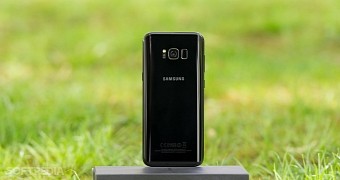Samsung is dragged into another snooping scandal, as a British newspaper has discovered that the Korean phone manufacturer is using technology to monitor online activity and collect data of users who purchased its devices.
The Sun writes that Samsung phones come with a technology called beacons that’s being used to track user activity when connected to the Internet, but also to collect information regarding specific content on the phone or even email messages.
Privacy watchdogs explain that Samsung is using these technologies to promote its own devices, and accuse the company of tricking people into agreeing with the use of beacons without them knowing exactly what they agree with.
Samsung: We’re not using ultrasonic beacons
Jim Killock, Executive Director of Open Rights Group, told the cited source that Samsung is becoming a “peeping Tom” and it’s “taking spying on their customers to a whole new level.”
Samsung explains in its privacy policy that it’s using beacons to collect information, and most users agree with it simply because only a few of them actually read the documents.
“We, along with certain third parties, also may use technologies called beacons or pixels that communicate information from your device to a server,” Samsung explains.
“Beacons can be embedded in online content, videos and emails and allow a server to read certain types of information from your device, know when you have viewed particular content or a particular email message, determine the time and date on which you viewed the beacon and the IP address of your device.”
In a separate statement, however, Samsung says that it’s not using ultrasonic beacon technology, which is considered far worse and which could be used for more complex snooping on devices.
“We would like to assure our customers that ultrasonic beacon technology is not embedded on Samsung mobile devices. Our privacy policy on beacons applies to the use of web beacons, a technology that is widely used across the industry and differs significantly to that of ultrasonic beacons. There is no relation between ultrasonic beacons and the functions embedded in our mobile products,” Samsung says.
Apple is also doing it
While this could very well be a false alarm and Samsung's beacons might be nothing more than telemetry systems similar to those that Microsoft has implemented in Windows 10, it also raises questions about the use of technology that users agree with and which is deeply buried into long privacy policies.
Most users do not even read the privacy policy when setting up a new phone, despite the fact that they agree with terms that would in the end lead to them having their data submitted to vendors and third parties.
On the other hand, several companies have taken a very aggressive stance against ultrasonic beacons, including Google, who has recently removed more than 200 apps from the Google Play Store after discovering they integrated such tech to spy on users’ habits and activities.
But even if they’re not ultrasonic beacons, media tracking and location beacons also collect private information from devices, experts warn.
“If you’re not paying attention to the permissions you grant, you could be feeding marketers and other entities information about your online browsing, what stores you go to and your product preferences without realising it,” Tristan Liverpool, Director of Systems Engineering, F5 Networks, said.
Samsung is not the only company that’s using beacons to collect user data, as Apple has also turned to similar tech that’s integrated into its websites, online services, emails, and adverts. Cupertino, however, says that data is not shared with third-party companies, and the IP address is kept secret, which means it does not create profiles for each user that’s monitored.

 14 DAY TRIAL //
14 DAY TRIAL //